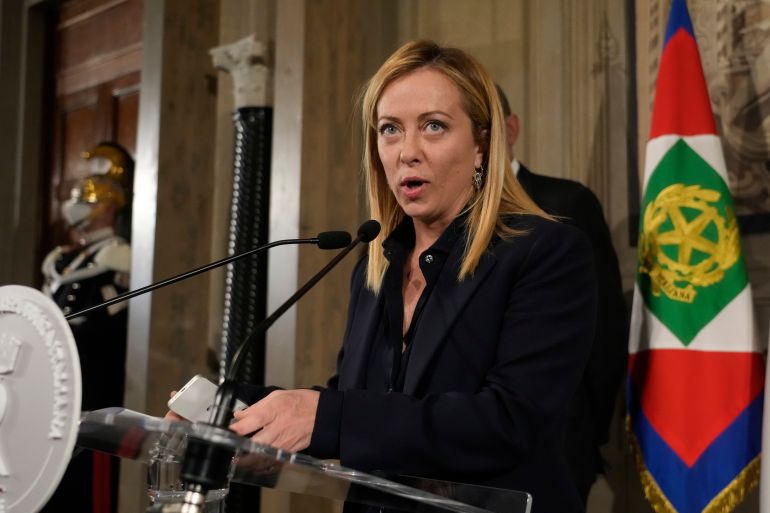Italy’s far-right leader Meloni forms new government
Giorgia Meloni insisted anyone joining her government must be solidly in sync with the West in opposing Russia’s war on Ukraine.

Giorgia Meloni has formed Italy’s new governing coalition, giving the country its first far-right-led government since the end of World War II and becoming the first woman tapped to serve as the country’s prime minister.
A presidential palace official announced on Friday that Meloni and her cabinet would be sworn in on Saturday. Meloni’s Brothers of Italy, a party with neo-fascist roots, was the top vote-getter in Italy’s national election last month.
Keep reading
list of 4 itemsFrom EU to immigration: What Italy’s next government might do
Elections: Why fascism still has a hold on Italy
Far-right leader Meloni formally asks for mandate to govern Italy
A few hours before the new government’s formation was announced, Meloni, 45, a career politician, told reporters she and her allies had unanimously asked President Sergio Mattarella to give her the mandate to govern.
Obtaining the prime minister post capped a remarkably quick rise for the Brothers of Italy. Meloni co-founded the party in December 2012, and it was considered a fringe movement on the right during its first years.
Meloni made no public comments before leaving the Quirinal presidential palace. Earlier in the day, she met Mattarella along with her two main, sometimes troublesome, right-wing allies – Matteo Salvini and former Prime Minister Silvio Berlusconi.
Meloni cited urgent problems “at both national and international level” – apparent references to soaring energy prices afflicting households and businesses and the war in Ukraine, which has seen European Union members divided over strategy amid worries about gas supplies during the approaching winter.
‘Arrogant’
Berlusconi and Salvini are longtime admirers of Russian leader Vladimir Putin. Meloni staunchly backs Ukraine in its defence against the Russian invasion. Those differences could make coalition rule challenging.
Berlusconi, a three-time prime minister, had chafed at the election victory of Meloni’s party. The Brothers of Italy took 26 percent, while Berlusconi’s Forza Italia and the anti-migrant League of Salvini, snagged just 8 percent apiece in an election on September 25 that saw record low turnout.
In 2018, in the previous election for parliament, Meloni’s party took just about 4 percent.
Still, while her forces are parliament’s largest, Meloni needs her two allies in order to command a solid majority in the legislature.
Berlusconi recently derided her as “arrogant” in written comments, apparently after Meloni refused to make a lawmaker who is one of the media mogul’s closest advisers a minister.
Earlier this week, in a meeting with his lawmakers, he expressed sympathy for Putin’s motivation for invading Ukraine. In that conversation, which was recorded and leaked to Italian news agency LaPresse, he also bragged that Putin had sent him bottles of vodka for his 86th birthday last month, and he gave the Russian leader bottles of wine while the two exchanged sweetly worded notes.
In response to Berlusconi’s comments that were also derogatory about Ukrainian President Volodymyr Zelenskyy, Meloni insisted anyone joining her government must be solidly in sync with the West in opposing Putin’s war. If that meant her government could not be formed, Meloni said, she would take that risk.
‘God, homeland, family’
Salvini has at times also questioned the wisdom of tough Western sanctions against Russia. A fellow lawmaker in Salvini’s League party, who was recently elected president of the lower Chamber of Deputies, has publicly expressed doubts about continuing the measures.
Outgoing Prime Minister Mario Draghi’s national pandemic unity coalition collapsed in July, after Salvini, Berlusconi and populist 5-Star Movement leader Giuseppe Conte refused to back his government in a confidence vote. That prompted Mattarella to dissolve parliament and pave the way for elections some six months early.
While final efforts to form the new government were under way, Draghi was in Brussels, attending the final day of a European Council summit, grappling with ways to deal with higher energy prices.
On Thursday, Mattarella received opposition leaders who raised concerns that Meloni, who campaigned with a “God, homeland, family” agenda, would seek to erode abortion rights and same-sex civil unions.
“The easiest way for people around the world to understand what going on in Italy is think of what would happen if Marine Le Pen became president of France, or what would happen if the far-right Alternative fur Deutschland led Germany,” said Alan Friedman, a journalist based in Lugano, Switzerland.
“This is the first time a party that traces its roots to the fascist era [has taken power in Italy]. Many of Meloni’s supporters are still nostalgic for the dictator Mussolini.”
Unapologetically intense, Meloni has forged a powerful personal brand that resonated with disaffected voters in elections last month, leading to her being named Italy’s first woman prime minister.
Railing against the European Union, mass immigration and “LGBT lobbies”, Meloni sees herself as a defender of Italy’s traditional Christian values, repudiating what she calls the politically correct rhetoric of the left.